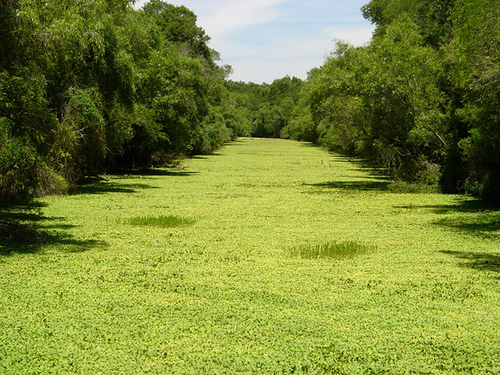

Location: 69 mi (112 km) North- West of Resistancia, Chaco Province Map
Area: 150 km²
Info: Captan Solari
Tel. (03725) 499 161
Admission Fee: free
Open: 9am- 7pm daily
The Chaco National Park is a protected natural area located in
the province of Chaco in Argentina. Its objective is the
conservation of the environment of the eastern zone of the Chaco,
characterized by its lagoons and jungle vegetation alternated with
palm groves and wetlands; These environments are developed in the
park around the course of the Negro River, which crosses the eastern
sector of the park. The national park has 14,981 hectares. The
climate is subtropical with no dry season.
The national park
has a Management Plan approved in 2019.
In the park there are forests of red quebracho, a
tree that has been cut down indiscriminately and reduced to the
point of putting it in danger of extinction during the 20th century.
The howler monkey and the talking parrot are other endangered
species that live within the area.
Within the park there are
diverse landscapes, such as mountains made up of trees up to 15 m
high, savannahs, estuaries and lagoons. The lagoons are Panza de
Cabra, Yacaré and Capybara.
The typical flora is that of red
quebracho and white quebracho, red thorn, lapacho, guayabí, guayacán
and chaguares. The characteristic fauna includes aguraguazues,
tapirs, brown deer, anteaters (very rare), tamaduás, pumas, greater
ferrets, collared peccaries, Moorish cats, guazunchos, carayá
monkey, alligators, aquatic turtles, cocoés, climbing frogs,
curiyús, etc. . Among the more than 340 species of birds are owls,
short owls, urutaú, woodpeckers, Paraguayan magpies, herons,
chajáes, biguaes, water cocks, storks, horneros, ducks, red-legged
chuñas and even rheas, etc.
In several areas of the park you
can camp. There is an interpretation trail that can be traveled by
vehicle, with two sections to be covered on foot. One of these
sections leads to the Capybara and Yacaré lagoons for bird watching,
and on the other trail you can see the native trees.
By resolution No. 126/2011 of the National Parks Administration of May 19, 2011, it was established that the national park would be classified for administrative purposes in the category protected areas of complexity III, for which it is headed by a designated intendant, On which 4 departments depend (Administration; Works and Maintenance; National Park Rangers; Conservation and Public Use) and the Dispatch and Entry, Exit, and Notifications Division.10 The administration has its headquarters in the town of Capitán Solari.
In 1936, the National Executive Power presented a bill to create 7
national parks and reserves, among which was the Chaco of 15,000 ha. The
law was not sanctioned by Congress and President Agustín Pedro Justo,
through decree no. 105,433 of May 11, 1937, declared 4 territories of
Patagonia to be national reserves for national parks, not including the
Chaco.
Its origin is considered to be Law no. 14366 on National
Assets in Provincialized Territories, sanctioned on November 19, 1954
and promulgated on October 22, 1954. This law mentions among the assets
that the National State retained when the Presidente Perón province
(after Chaco) was created.
ARTICLE 1.- In accordance with the
terms of article 14 of Law 14,037, the following properties, classified
by location and purpose, will continue to belong to the domain of the
national State: (...) National Parks: lots 6 and the southern half of
lot 7, of Colonia Pastoril.
The area mentioned by the law was
12,500 ha because league b of lot VI (called Reforestación Capitán
Solari, of 2,500 ha) was awarded to the then Head of the Forest
Administration. This sector was incorporated into the national park in
1966 when the survey was carried out, which showed 14,981 ha. The
transfer of the movable and immovable property of the sector was carried
out in 1968.
Law No. 19292 on the Limits of the different Parks
and Reserves, sanctioned and promulgated on October 11, 1971, mentions
it as the Chaco National Park.
Article 1°.- The areas included
within the limits expressed below are hereby declared a National Park
and according to the following denomination: (...)
Art. 5°.- The Río
Pilcomayo, Chaco, El Rey and Tierra del Fuego National Parks, as well as
the Formosa Natural Reserve and the Petrified Forests Natural Monument,
are maintained as such and in accordance with the laws of their
creation.
The National Parks Law No. 22351, sanctioned and
promulgated on November 4, 1980, confirms it as a national park,
mentioning Law No. 14366.7
ARTICLE 32. — For the purposes of this
law and due to the reservations duly established by the National State
or the transfer of ownership and jurisdiction of the respective
provinces, the following are currently included in the system of
National Parks, Natural Monuments and National Reserves, without
prejudice to those that may be incorporated in the future: (...) 11.-
CHACO NATIONAL PARK (Law 14,366).
Decree No. 2149/1990 of 10
October 1990 designated a sector of the national park as a strict nature
reserve. The boundaries of the strict nature reserve were modified by
decree No. 453/1994 of 23 March 1994, which reduced it to 2 sectors of
about 2500 ha and created the wild nature reserve covering half of the
park.
The General Management Plan for Chaco National Park was
presented in December 2001.
By resolution no. 126/2011 of the National Parks Administration of May 19, 2011, it was established that the national park would be classified for administrative purposes in the category of protected areas of complexity III, for which reason it is headed by a designated superintendent, under whom 4 departments depend (Administration; Works and Maintenance; National Park Rangers; Conservation and Public Use) and the Division of Dispatch and Entry, Exit, and Notification Desk. The superintendent's office is based in the town of Capitán Solari.